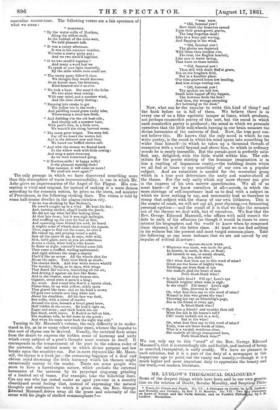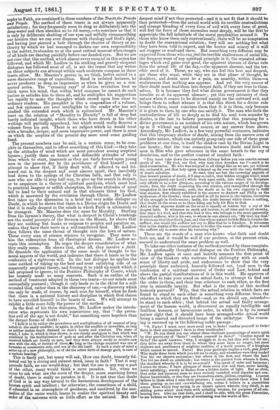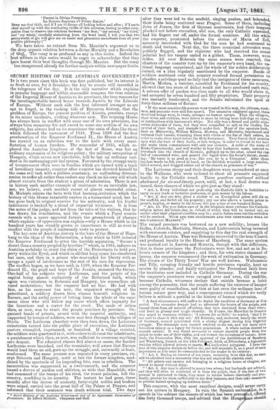MR. LUDLOW'S THEOLOGICAL DIALOGUES.* SOME of the deepest things which
have been said in our own tion on the relation of Doubt, Secular Morality, and Sceptic
nem- Philo-
* Tracts for Priests and People. No. : A Dialogue on Doubt, by . Ludlow; and Morality and Divinity, by Rev. F. D. Maurice. No. VII.: Two y on Laws of Nature and the Faith therein, and on Positive Phil phy, by Jr- Ludlow. Macmillan.
sophy to Faith, are contained in these numbers of the Tractsfor Priests mad People. The method of these tracts is not always apparently satisfactory ; for they frequently seem to drag us deliberately into the deep water and then abandon us to its mercy,—to convince us that it is only by deliberate shutting of our eyes and wilfully circumscribing our horizon that we can ever dispense with theology and God's light, and having just pierced a hole through the shutter of theory or au- thority by which we had managed to darken our own responsibility in the matter, to abandon us at the most critical moment when images of all kinds are dancing painfully before our dazzled eyes. But we are not sure that this method, which almost every essayist in this series has followed, and which Mr. Ludlow in his striking and gravely eloquent dialogues has followed most of all, is not the truest that any writer on these subjects can attempt within such moderate compass as these tracts allow. Mr. Maurice's genius is, we think, better suited to a mere discursiveof exposition. Read in isolated lectures, he never produces rsaonEep an impression as when he gives us a con- nected series. The "crossing rays" of divine revelation beat so thick upon his mind, that within brief compass lie cannot do such justice as satisfies him to them all, and he multiplies his suggestions too rapidly to make the thoughts which crowd upon him clear to ordinary readers. His pamphlet is like a compendium of a volume, and few epitomes are ever intelligible to the reader who has not studied the extended work which is epitomized. Mr. Maurice's tract on the relation of "Morality to Divinity" is full of deep but barely indicated insight, which those who have drunk in his other writings will partially apprehend, but which would really deserve a volume from his pen. There is no subject which lie would treat with a broader, deeper, and more impressive power, and there is none on which the sceptics of the present day more need some guiding hand.
The present numbers may be said, in a certain sense, to be com- plete in themselves, and to effect something of this kind :—they take up the attitudes of mind which are most prevalent among sceptical laymen; justify them as honest and defensible attitudes of mind from which to start, inasmuch as they are fairly forced upon young men in the present day by the providence of God himself ; and attempt to show that, if fairly dealt with, if adhered to and fol- lowed out in the deepest and most sincere spirit, they inevitably lead down to the springs of the Christian faith, and that only in men who are able to stop half way, to give up the search in despair, or to acquiesce in a theory of spiritual paralysis, which must lead to practical languor or selfish absorption, do these attitudes of mind fail to lead to their natural end in that ultimate thirst for God, which is answered by the revelation through Christ. Mr. Ludlow first takes up the discussion in a brief but very noble dialogue on Doubt, in winch lie shows that there is a Divine origin for Doubt and that it is really deepest in the minds in which Faith is ultimately to be strongest. Mr. Maurice does the same for Morality. Starting from the layman's theory, that what is deepest in Christ's teachings are the moral precepts of the Sermon on the Mount, he shows that they are nothing but husks or enigmas to perplex and paralyze us, unless they have their roots in a self-manifested God. Mr. Ludlow then follows the same thread of thought into the laws of nature. These every man of science rejoices to recognize. They seem to him the redemption from all theological dreams. Mr. Ludlow ac- cepts this assumption. He urges the deeper consideration of what they really mean. He shows that, after all, they involve a faith. He demands the application of the same mode of thought to the moral aspects of the world, and indicates that there it lands us in the confession of a righteous will. In the last dialogue he applies the same method of taking up the best and most satisfying side of an apparently sceptical theory, and forcing it to yield up much which it had proposed to ignore, to the Positive Philosophy of Comte, which has recently made so many converts. Such is an outline of the method of treatment adopted in these two tracts—to our minds most successfully pursued; though it only lands us in the thirst for a self- revealed God, rather than in the discovery of one,—a discovery which can only be made, of course, by each man for himself, when he finds that there is a national history and discipline in which God claims to have unveiled himself to the -hearts of men. We will attempt to exhibit a little more fully the power of the method.
In the first of his three dialogues, Mr. Ludlow makes the interlo- cutor who represents his own convictions say, that " the preva- lent evil of the age is not doubt," but something more hopeless than the deeper forms of doubt :
" I hold it to be rather the prevalence and multiplication of all manner of lazy beliefs in the easily credible; or again, in either the credible or incredible, so long as neither makes much demand on men's hearts and conduct. The state of mind, I take it, which is thus shown, is one closely analogous to that which wag exhibited in the multiplication of gods at and after the Christian era, when all received beliefs sat loosely on men, and they were always ready to receive new ones with the old, or instead of them,*o long as the change required was one of formulas or ceremonies only, and not of the life itself. In such a state of mind a setter up of a new philosophy, as of old the setter forth of strange gods, is sure of a curious hearing.' This is finely put, but many will ask, How can doubt, honestly fol- lowed out by a strong and earnest mind, issue in faith? That it may precede faith, no one would deny; but that the one is any way a part of the other, many would think a mere paradox. Yet, when we come to ask what are the roots of the deeper, more searching forms of doubt, there is really no paradox in it. It is not true that doubt of God is in any way natural to the harmonious'
armonious development of the human spirit and intellect ; far otherwise; the conscience of a child, if educated in an atmosphere of goodness, and unstirred by the ano- malies of the outer world, learns to realize the spiritual beauty and order of the universe with as little effort as the natural. But the
I deepest mind if not thus protected—and it is not fit that it should be thus protected—from the actual world with its terrible contradictions and strange blending of every form of evil with every form of good, will feel the force of those anomalies most deeply, will be the first to appreciate the full infinitude of the moral perplexities around it. To those who know them only conventionally, there will be no temptation to doubt the conventional solution ; they will see nothing but what they have been told to expect, and the horror and misery of it will not stagger or confound them. But something very different may be expected from those who caufeel the terrible shallowness of social life, the frequent want of any spiritual principle in it, the repeated advan- tages which evil gains over good, the apparent absence of divine rule from the actual life of the day,—the apparent absence, and the ter- rible need of it. Those, we say, who can feel this best and deepest, are those who must, while they are in that phase of thought, be doubters, and doubt must be a pain, an anarchy, within them—a restlessness that nothing sap appease. And yet the very source of their doubt must lead them into deeper faith, if they are true to them- selves. It is because they feel what divine government is that they tremble so at its apparent absence ; yet this very intensity of their nature when it ceases to be directed mainly on the outward evil, and brings them to reflect whence it is that this thirst for a divine rule comes to them, must convince them that it is in them, only because it is given to them by one who can satisfy it. The man who feels the contradictions of life so deeply as to find his soul torn asunder by doubts, is time last to believe permanently that this yearning for a divine government is an accident of his own nature, which has grown up in it without any spiritual source, or any answer from above. Accordingly, Mr. Ludlow, in a few very powerful sentences, indicates that this temporary shadow of doubt, arising from the narrow area of our finite nature, which can entirely grasp only one side of these great problems at one time, is itself the shadow cast by the Divine Light in our hearts ; that the true connexion between doubt and faith was seen in Him who gave utterance in the same breath to the cry of desolation, and to time perfect content of implicit faith :
"Yon must take down the cross from Calvary before you can convict earnest doubt of sin. My God, my God, why hest thou forsaken me ?—such is its final consecration. He who was tempted in all things like as we are, yet without sin, endured it, and that holy agony is bound up for ever with the very fulfilment of man's salvation. . . . . So read, they are but the crowning anguish of that inward passion of doubt, if I may so call it, that hidden struggle which must have accompanied our Lord's whole work upon earth, into which the Scripture only affords to us a few glimpses, according to the various stages of its develop- ment; first, the doubt respecting His own mission, and exemplified through the temptation in the wilderness; next, the doubt as to his own capacity to fulfil that mission, first clearly exhibited in the answer to Andrew and Philip as the spokesmen of the Greeks; then unveiled in all its terror in the various narratives of the struggle in Gethsemane ; lastly, the doubt beyond which there is nothing, that doubt on the cross as to there being any help for Him in God. . . . . And so that supreme doubt on the cross is equally at bottom but a cry of the deepest faith. It witnesses to earth and heaven, to all time and to all eternity, that there is a God, and that this God is One who belongs to the most apparently deserted sufferer, who is his own, to whom he can always erv, My God, my God.' It witnesses that that God is just, and One whose nature forbids Him to forsake the sufferer, else would the sufferer not cry to Him that he is forsaken. It witnesses that in the depths of His counsel alone is hidden the cause of suffering, else would the sufferer cry to some other his torturing why."
These are the words of a man who knows what faith and doubt both are, and it would be well if our prelates, at the present crisis, seemed to understand the same problem as well.
To take one other instance of the method pursued by these essayists. In time profoundly thought-out dialogue on the Positive Philosophy, Mr. Ludlow again at once and heartily assumes the first point of view of time thinkers who embrace that philosophy with so much sense of liberty and pride, and endeavours to show that the very principle there embraced, honestly followed out, lead men to the confession of a spiritual universe of Order and Law, behind and above the partial manifestations of it in this world. He approves of the effort to take your stand on actual facts, to attempt to find out the order in them, and their true relations to each other, as the first step in scientific inquiry. But what is the result of this method honestly pursued? Why, that the actual relation in which facts are found to stand to each other is something very different from the relation in which they are fitted—and, as we should say, intended— to stand to each other ; that behind the actual and faulty arrange- ment of the human world, is discovered an equally intelligible and faultless kosmos, or harmonious order, in which it is by its inward nature right that it should have been arranged—the actual world being a marred and distorted image of the archetype. The reason- ing is summed up in time following noble passage : "S. Facts! I must once more recal you to facts ! confine yourself to facts! facts in their successions ! facts in their similitudes " W. Do you think you can silence these obstinate questionings of man's spirit by that parrot-cry of facts!''confine yourself to facts?' Confine myself to facts?' the spirit answers, ' why, I struggle to do so, but they will not let me; they drive me away from them to where they seem facts no longer, but mere shadows and semblances of mightier realities, of a world unseen, of a kingdom which cannot be moved. Facts! But your participle implies a verb, psis fecit? Who made these facts which you tell me to study, and wherefore were they made? You bid me observe succession ; but where is the first, and where the last? You bid me dwell on similitude; • but where is the pattern from whence it flows, the standard whereby it is to be measured ? You speak of order and harmony ; I crave for them ; I have glimpses of them every now and then, never lasting, never satisfying; merely as flashes from a hidden realm of light. But as often, that order and harmony seem to have entirely vanished amid disorder and con- fusion inextricable, or else they are themselves stern, pitiless, crushing. I cannot believe in them when I miss their presence ; I cannot cherish them when I feel them grating on me and overwhelming me, unless I believe in a quenchless source from which they spring, in an unseen sphere wherein they dwell, in an abiding power which uses them with unfailing wisdom, for purposes of all-em- bracing love. Give me that faith, and I shall be able, with the great Florentine, to see written on the very gates of everlasting woe the words of
Deny me that faith, and if I am to forego all looking before and after ; if I am to shut myself up with the everlasting riddle of this universe, having no other occu-
































 Previous page
Previous page